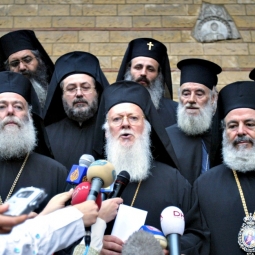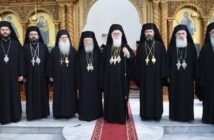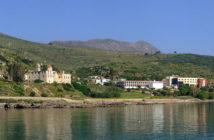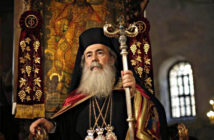
Ecumenical Patriarch Bartholomew I of Constantinople (c) addresses the media in Istanbul, Turkey. Church unity over the long-awaited Pan-Orthodox Church council is eroding just days before it is set to convene
Source: National Catholic Register
NEWS ANALYSIS: Denying Catholics status as “Church” is only one point of controversy for the foundering pan-Orthodox Council.
BY VICTOR GAETAN
The Holy and Great Council of Orthodox patriarchs, meeting for the first time in 1,139 years, appears to be unraveling.
June 19 — Pentecost Sunday for Eastern-Orthodox Christians — is when the Pan-Orthodox Council is scheduled to open at a theological academy on the island of Crete.
But on June 1, leadership of the Bulgarian Orthodox Church announced the council should be postponed until numerous unspecified issues are addressed, from guest seating and procedures for editing texts to costs. The Church said it would boycott the meeting if held this month.
Five days later, another Church announced it could not participate: the Greek Orthodox Patriarchate of Antioch and All the East, based in Damascus Syria, which has been embroiled in a jurisdictional dispute with the Orthodox Church of Jerusalem. The two churches have broken communion.
Since the disagreement has not been settled, and Ecumenical Patriarch Bartholomew of Constantinople scheduled mediation for after the council, the Antioch Church considers it impossible to attend a council dedicated to unity.
The unraveling accelerated by the end of the week, with the Serbian Orthodox Church and Orthodox Church of Georgia piling on, adding a specific complaint about the agenda item on ecumenical dialogue.
The discontented communities are close to the most powerful Church in the assembly: the Russian Orthodox Church, with more people and more money than any other.
A total of 350 clerics comprise the council — each patriarch is accompanied by 24 bishops.
Incredibly, at least in light of all of the recent discontent, all 14 churches approved an agenda only five months ago in Switzerland, although some Christian reporters sensed discontent that could derail the gathering, despite planning that stretches back decades.
The discord touches directly on the Catholic Church and its long ecumenical dialogue with the Orthodox Church, dating back to 1964, when Pope Paul VI and Patriarch Athenagoras met in Jerusalem to begin healing that old wound of division, the Great Schism of 1054.
What is going on?
Disunity
Orthodox churches function, normally, with extensive autonomy.
Most of the 14 autocephalous (self-governing) churches are defined by national jurisdictions — the Orthodox Churches of Albania, Bulgaria, Czech and Slovakia, Georgia, Greece, Poland, Romania, Russia and Serbia — while another five trace histories back to ancient communities: Alexandria, Antioch, Constantinople, Cyprus and Jerusalem.
With authority flowing from the ancient seat of the Byzantine Empire, Patriarch Bartholomew of Constantinople is considered “first among equals” in relation to other Orthodox leaders, as a matter of history.
Although he has the power to convene a Pan-Orthodox Council, he can’t command other patriarchs to follow him, a fact the current kerfuffle makes clear.
When dissatisfaction became public, leadership of the Russian Orthodox Church was swift to read discord as potentially fatal.
Metropolitan Hilarion, chairman of the Russian Orthodox Church’s department for external church relations (effectively its foreign minister), recommended that Patriarch Bartholomew convene an emergency meeting to iron out problems before leaders descend on Crete.
Because decisions are supposed to be made by consensus, the absence of even one local Church undermines the meeting’s authority, Hilarion explained to a Russian TV station on June 7.
“If these issues are resolved, then the council will take place. If they are not, then it’s probably best to postpone it,” Metropolitan Hilarion told Russia-24 TV.
Greek Orthodox Metropolitan Chrysostomos Savatos, who will represent his Church at the council, echoed Hilarion in emphasizing that participation of all is critical. But he voiced puzzlement regarding what inspired fractures.
“I am certain that the Holy Spirit will enlighten the minds of primates,” the Greek leader told La Stampa. “I do not understand why this change has come about. This is an historic moment, and none of the Orthodox Churches must be absent from this Pan-Orthodox Council.”
The patriarchate of Constantinople beseeched all parties to stick with the program, noting “with surprise and wonder” that the Churches already had agreed to it. Plus, further discussion could occur during the council.
But the negative snowball only picked up speed after Bartholomew insisted the Holy and Great Council would go ahead as planned.
Power Struggle?
Some observers posit that underlying the tempest is a major rivalry between the Orthodox world’s Greek-dominated Hellenistic pole and its Moscow-dominated Slavic pole.
As the Italian analyst Sandro Magister wrote in January, “The rivalry between the powerful Russian Church, which encompasses two-thirds of the world’s Orthodox population, and the ecumenical patriarchate of Constantinople, which numbers less than three thousand faithful in Istanbul but boasts a primacy of honor over all of Orthodoxy, has in fact been for years one of the most serious conflicts within the Christian East, with important repercussions for relations with the Church of Rome.”
He continued, “What happens at the Pan-Orthodox Council will show what kind of new equilibrium will emerge between the two most significant leaders of all Orthodoxy, Kirill and Bartholomew.”
“Kirill plainly intends, in fact, to strip Bartholomew of his exclusive status as the top symbolic representative of Orthodoxy in the world,” the Italian journalist predicted.
Yet, just six years ago, the two patriarchs celebrated Pentecost together, in Greek and Slavonic, at a monastery outside of Moscow.
Patriarch Kirill declared, “In raising up praise to God with one heart in different languages, we are once again reliving the miracle of Pentecost,” he said.
And Patriarch Bartholomew has been consistently solicitous of Moscow’s preferences in the lead-up to the council: In fact, the meeting was moved from Istanbul to Crete at the request of the Russian Orthodox Church, concerned about security after the Turkish military blew up a Russian jet.
Originally, the Holy and Great Council was to be held in Hagia Irene, where the Council of Constantinople endorsed the Nicene Creed in 381 — a location that would have affirmed the deeply historical leadership of Bartholomew and his predecessors.
Weakness of Bartholomew
Instead, the specter of churches peeling off just days before the council convenes underscores Bartholomew’s weakness with regard to settling inter-Church disputes — an especially precarious aspect of relations within Orthodox Christianity, according to Father Cyril Hovorun, a research fellow at Yale Divinity School, who previously served as chairman of the department for external relations of the Ukrainian Orthodox Church and as first deputy chairman of the educational committee of the Moscow Patriarchate.
At first, it seems surprising that a community facing genocide, as is the Orthodox Church of Antioch, would take action to undermine a united council, especially since the existential crisis of Middle-Eastern Christianity is one threat arguing for greater unity.
Yet the Antioch grievance seems to be a legitimate complaint: The patriarchate has historically governed Orthodox communities on the Arabian Peninsula and the Persian Gulf, including Qatar.
In March 2013, the Orthodox Patriarchate of Jerusalem ordained as archbishop of Qatar a priest serving there with permission of the Antioch Patriarchate, without consulting Antioch Patriarch John X — more importantly, without jurisdiction to make the appointment.
The Antioch Church has spent the last three years urging the Patriarchate of Constantinople to rectify the “illegal interference” of the Jerusalem Church.
A Catholic source on the region, AsiaNews.it, considers the conflict to be indicative of complex regional rivalries embedded in international struggles.
But Orthodox lawyer Carl Saba, who serves as communications director for the Assembly of Orthodox Bishops of France, wrote a year ago, “This is not a mere ‘territorial dispute’ between two sister churches, but an issue that touches the very heart of the unity of the entire Orthodox Church, a unity that is based on the one hand on communion of faith and on the other hand on respect by all the Orthodox churches for the canons of the ecumenical councils,” including canonical jurisdiction, a problem festering for several years.
Saba also highlights the key issue of Orthodox relations with its far-flung diaspora, which expects more pastoral care, more evangelization and more engagement than some old-school leaders seem to realize.
Catholics Are Heretics?
For Roman Catholics, most worrisome is a development among some Orthodox communities that could put a huge wedge in more than 50 years of dialogue.
When the churches of Georgia and Serbia renounced the Pan-Orthodox Council last week, they singled out a specific document, accepted in January, as problematic: “the relation of the Orthodox Church towards the rest of the Christian world,” the council agenda item most relevant to the Catholic Church — and one of five documents already accepted in January.
Some Orthodox leaders, including a group in Bulgaria, don’t think Catholicism should be described as a “church,” because they consider it a heresy.
A wing of the Greek Orthodox Church promulgates this anti-Catholic attitude, too. Outspoken Greek Orthodox Metropolitan Serafim of Piraeus even disapproves of having non-Orthodox observers at all.
Top Vatican Advisers Engaged
Pope Francis is sending two observers to Crete: Cardinal Kurt Koch, president of the Pontifical Council for the Promotion of Christian Unity, and the council’s secretary, Bishop Brian Farrell.
Bishop Farrell discussed the council’s complexity with America magazine’s Vatican correspondent last week, explaining that the document on ecumenical relations “sets out a vision that is very conservative; it insists on the point that the Orthodox Church is the only one, true church. It recognizes that relations with the Catholic Church are hugely important and positive, but there is no recognition of the Catholic Church as church in the proper sense.”
“The atmosphere is very difficult, and we have to wait and see if the reality of the ecumenical relations down these years is recognized or not,” observed the Irish bishop.
“Over past decades we have called ourselves ‘sister churches,’ we have cooperated together, and we have made theological agreements and signed them as ‘sister churches.’ But now we have to see whether the tremendously conservative trend that is dominating in some of their churches will prevail,” he told America.
Bishop Farrell was quick to explain the Russian Orthodox Church is not one of the “conservative” churches, to which he alluded: “We don’t have this problem with the Russian Orthodox; they are quite positive about our relationship with them.”
In La Stampa last week, Greek Orthodox Metropolitan, Chrysostomos Savatos reassured readers that only a minority among Orthodox leaders consider the Catholic Church inferior: “The Catholic Church has always been considered a Church. What you are referring to is a proposal put forward by some conservatives who do not want to place the Churches on the same level. But I think it is unlikely the proposal will go through. There are many others who do not agree with this amendment.”
Is there a role for the Holy Father in helping smooth some of the diplomatic edges?
He has excellent relations with many of the interlocutors: from Patriarch Kirill and Ecumenical Patriarch Bartholomew to Antioch Patriarch John X and the ruling family of Qatar, with whom he met last week.
Invariably, the Holy Father sees his — and our — chief role as praying for the Orthodox Church and the Holy Spirit’s guidance.
Senior Register correspondent Victor Gaetan is an award-winning international correspondent and a contributor to Foreign Affairs magazine.



